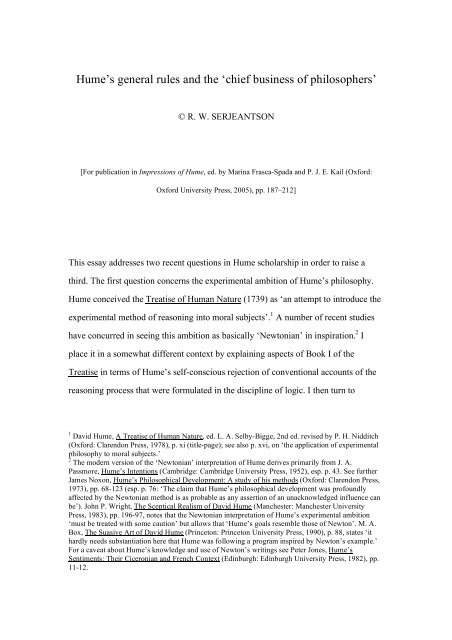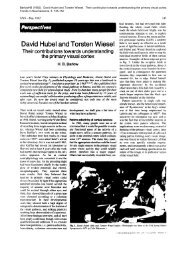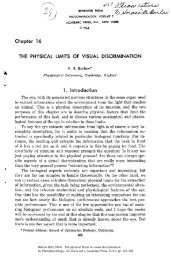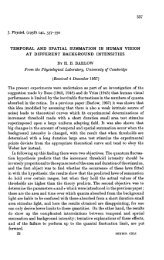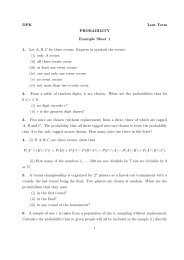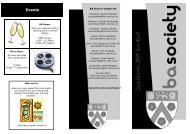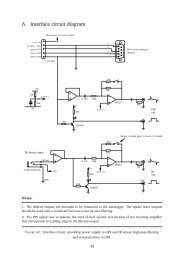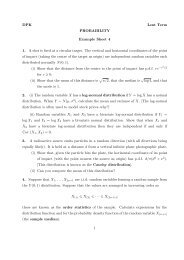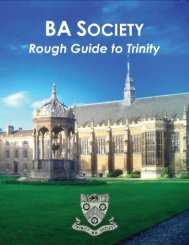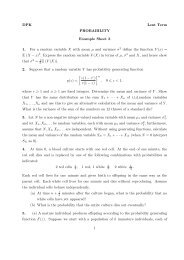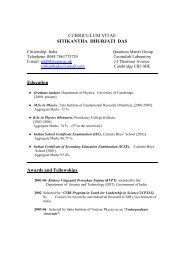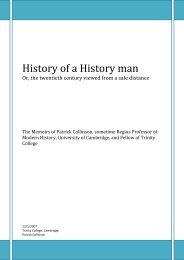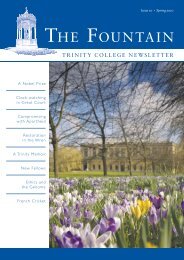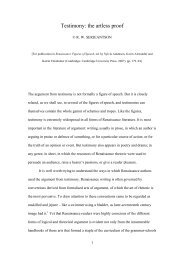Hume's General Rules - Serjeantson
Hume's General Rules - Serjeantson
Hume's General Rules - Serjeantson
Create successful ePaper yourself
Turn your PDF publications into a flip-book with our unique Google optimized e-Paper software.
Hume’s general rules and the ‘chief business of philosophers’<br />
© R. W. SERJEANTSON<br />
[For publication in Impressions of Hume, ed. by Marina Frasca-Spada and P. J. E. Kail (Oxford:<br />
Oxford University Press, 2005), pp. 187–212]<br />
This essay addresses two recent questions in Hume scholarship in order to raise a<br />
third. The first question concerns the experimental ambition of Hume’s philosophy.<br />
Hume conceived the Treatise of Human Nature (1739) as ‘an attempt to introduce the<br />
experimental method of reasoning into moral subjects’. 1 A number of recent studies<br />
have concurred in seeing this ambition as basically ‘Newtonian’ in inspiration. 2 I<br />
place it in a somewhat different context by explaining aspects of Book I of the<br />
Treatise in terms of Hume’s self-conscious rejection of conventional accounts of the<br />
reasoning process that were formulated in the discipline of logic. I then turn to<br />
1 David Hume, A Treatise of Human Nature, ed. L. A. Selby-Bigge, 2nd ed. revised by P. H. Nidditch<br />
(Oxford: Clarendon Press, 1978), p. xi (title-page); see also p. xvi, on ‘the application of experimental<br />
philosophy to moral subjects.’<br />
2 The modern version of the ‘Newtonian’ interpretation of Hume derives primarily from J. A.<br />
Passmore, Hume’s Intentions (Cambridge: Cambridge University Press, 1952), esp. p. 43. See further<br />
James Noxon, Hume’s Philosophical Development: A study of his methods (Oxford: Clarendon Press,<br />
1973), pp. 68-123 (esp. p. 76: ‘The claim that Hume’s philosophical development was profoundly<br />
affected by the Newtonian method is as probable as any assertion of an unacknowledged influence can<br />
be’). John P. Wright, The Sceptical Realism of David Hume (Manchester: Manchester University<br />
Press, 1983), pp. 196-97, notes that the Newtonian interpretation of Hume’s experimental ambition<br />
‘must be treated with some caution’ but allows that ‘Hume’s goals resemble those of Newton’. M. A.<br />
Box, The Suasive Art of David Hume (Princeton: Princeton University Press, 1990), p. 88, states ‘it<br />
hardly needs substantiation here that Hume was following a program inspired by Newton’s example.’<br />
For a caveat about Hume’s knowledge and use of Newton’s writings see Peter Jones, Hume’s<br />
Sentiments: Their Ciceronian and French Context (Edinburgh: Edinburgh University Press, 1982), pp.<br />
11-12.
<strong>Serjeantson</strong>-2<br />
consider in detail Hume’s account of ‘general rules’ as a species of probability, and<br />
relate them to earlier accounts of the role of ‘rules’ in philosophy. This aspect of my<br />
argument provides a point of entry into the second question that has been raised by<br />
recent commentators on Hume’s writings: how far his account of reason is normative<br />
or obligatory. 3 I shall suggest that the uncertainty of Hume’s commentators on this<br />
question reflects an uncertainty in early modern philosophy about the function of rules<br />
in respect of reason. From these two vantage points, I turn in the final part of this<br />
essay to address the larger question suggested by my title: what did Hume take to be<br />
the task or office of philosophy? 4<br />
The ‘experimental method’ and the discipline of logic<br />
What Hume calls the ‘experimental method’ came about as a consequence of<br />
developments in the discipline of natural philosophy between the later sixteenth and<br />
the early eighteenth centuries. In the course of the seventeenth century a new form of<br />
inquiry, dubbed by its practitioners ‘experimental natural philosophy’ and in good<br />
part pursued outside the universities, had arisen to challenge the claims of the natural<br />
philosophy taught in the schools. This neo-Aristotelian natural philosophy was<br />
characterised by explanations that were universal--which described what happened<br />
‘all, or most of the time’ in the ‘ordinary course of nature’. It was a natural philosophy<br />
that drew upon logical and metaphysical principles, often couched in the form of selfevident<br />
or precognitive axioms such as ‘the whole is greater than the part’ or ‘nature<br />
3 See in particular Antonia LoLordo, ‘Probability and skepticism about reason in Hume’s Treatise’,<br />
British Journal for the History of Philosophy, 8 (2000): 419-46, esp. pp. 443-46; also Marie Martin,<br />
‘The rational warrant for Hume’s general rules’, Journal of the History of Philosophy, 31 (1993): 245-<br />
57, esp. pp. 252-57.<br />
4 This question has recently been raised, from a somewhat different perspective, by C. J. Finlay,<br />
'Enlightenment and the university: philosophy, communication, and education in the early writings of<br />
David Hume', History of Universities, 16 (2000): 103-34, esp. pp. 115-28.
<strong>Serjeantson</strong>-3<br />
does nothing in vain’. And it appealed to notions of generalised ‘experience’ rather<br />
than particular experiments. 5<br />
The new natural philosophy, in contrast--and particularly in its British<br />
instantiation--emphasised the particularity of natural phenomena. Experiments were<br />
conceived of precisely as ways of diverting nature from its ordinary course, with<br />
experimental natural philosophers deliberately seeking out marvellous and prodigious<br />
phenomena. Such natural philosophers, too, rejected both traditional logic as a means<br />
to direct their enquiries and traditional metaphysics as a means of explaining the<br />
phenomena they discovered. And in their essayistic and unsystematic reports they<br />
appealed not to a tacit consensus of ‘experience’, but instead described particular<br />
experiments in all their circumstantial detail. In the course of the seventeenth century,<br />
natural philosophy transformed itself (in Aristotelian terms) from a theoretical to a<br />
practical discipline.<br />
The history of the philosophy of ‘human understanding’ in this period can in<br />
part be seen as an attempt to explain the implications of these developments for<br />
reasoning and psychology. 6 Throughout the seventeenth century a number of works<br />
were written that attempted to give philosophical shape to these developments.<br />
Among these writings, which include some of the most justly celebrated philosophical<br />
works of the period, were Francis Bacon’s Novum organum (‘New instrument’, 1620;<br />
Hume considered Bacon ‘the father of experimental physicks’); 7 René Descartes’s<br />
Regulae ad directionem ingenii (‘<strong>Rules</strong> for the direction of the mind’, written c. 1628)<br />
5 See further Peter Dear, Discipline and Experience: The Mathematical Way in the Scientific<br />
Revolution (Chicago: University of Chicago Press, 1995), esp. pp. 15-25.<br />
6 For background to this point, see Frederick S. Michael, ‘Why logic became epistemology: Gassendi,<br />
Port Royal and the reformation in logic’, in Logic and the Workings of the Mind: The Logic of Ideas<br />
and Faculty Psychology in Early Modern Philosophy, ed. Patricia Easton, North American Kant<br />
Society Studies in Philosophy 5 (Atascadero, CA: Ridgeview, 1997), pp. 1-20; Gabriel Nuchelmans,<br />
'Logic in the seventeenth century: preliminary remarks and the constituents of the proposition', in The<br />
Cambridge History of Seventeenth-Century Philosophy, ed. Daniel Garber and Michael Ayers, 2 vols<br />
(Cambridge: Cambridge University Press, 1998), vol. 1, pp. 103-17, pp. 104-05.<br />
7 David Hume, An Abstract of a Book Lately Published, in Treatise, pp. 641-62, p. 646.
<strong>Serjeantson</strong>-4<br />
and Discours de la méthode (‘Discourse on method’, 1637); 8 Baruch de Spinoza’s<br />
Tractatus de emendatione intellectus (‘Treatise on the emendation of the intellect’, c.<br />
1658); Nicolas Malebranche’s Recherche de la vérité (1674-75); Ehrenfried Walter<br />
von Tschirnhaus’s Medicina mentis (‘Medicine of the mind’, 1695); 9 John Locke’s<br />
Essay Concerning Humane Understanding (1690) and Gottfried Wilhelm von<br />
Leibniz’s dialogic commentary upon it, the Nouveaux essais sur l'entendement<br />
humain (‘New essays on human understanding’; written between 1703 and 1705, but<br />
first published only in 1765, and therefore unknown to Hume when he wrote the<br />
Treatise); George Berkeley’s Treatise Concerning the Principles of Human<br />
Knowledge (1710, 1734), and indeed Hume’s Treatise of Human Nature. By<br />
definition--since they are in good part written in reaction against it--such works do not<br />
fit neatly into the disciplinary categories that the dominant Aristotelian philosophy of<br />
the sixteenth and earlier seventeenth centuries was so effectively structured by.<br />
Nonetheless all of these works, as well as drawing upon natural philosophy, faculty<br />
psychology, and even medicine, take on a great part of their significance when seen in<br />
the context of the discipline of logic. 10<br />
It was in discipline of logic that questions about reason and the nature of<br />
knowledge were treated in conventional school-philosophy. It is thus the discipline of<br />
logic that should underlie our attempts to understand the significance in the history of<br />
philosophy of the emphasis that emerged in the later seventeenth century on ‘human<br />
understanding’. Indeed, this emphasis developed in part from works of logic<br />
8 On Descartes’s Regulae as a form of logic, see Eric Palmer, ‘Descartes’s <strong>Rules</strong> and the workings of<br />
the mind’, in Logic and the Workings of the Mind, pp. 269-82.<br />
9 Ehrenfried Walther von Tschirnhaus, Medicina mentis (Leipzig: Thomas Fritsch, 1695, 2nd ed.). On<br />
this work, see C. A. van Peursen, ‘E. W. von Tschirnhaus and the ars inveniendi’, Journal of the<br />
History of Ideas, 54 (1993): 395-410; Martin Schönfeld, ‘Dogmatic metaphysics and Tschirnhaus’s<br />
methodology’, Journal of the History of Philosophy, 36 (1998): 57-76; Catherine Wilson, 'Between<br />
medicina mentis and medical materialism', in Logic and the Workings of the Mind, pp. 251-68.<br />
10 This point is made effectively by Lorne Falkenstein and Patricia Easton, ‘Preface’, in Logic and the<br />
Workings of the Mind, pp. i-vii, pp. ii-iii. See also Norman Fiering, Moral Philosophy at Seventeenth-<br />
Century Harvard: A Discipline in Transition (Chapel Hill: University of North Carolina Press, 1981), p.<br />
240 n. 3.
<strong>Serjeantson</strong>-5<br />
themselves. A number were published which endeavored to apply some of the<br />
different theories of the ‘new philosophy’ to logic. 11 Pierre Gassendi’s (1592-1655)<br />
posthumously published Institutio logica (‘Logical institution’, 1658) incorporated<br />
Gassendi’s neo-Epicurean account of knowledge into the discipline. La Logique, ou<br />
l’art de penser (‘Logic, or the art of thinking’, 1661; fifth edition 1683) of the Port-<br />
Royalists Antoine Arnauld and Pierre Nicole--as well taking a number of tacit<br />
sideswipes at Gassendi’s logic 12 -- incorporated aspects of the Cartesian philosophy of<br />
ideas into a logical structure. 13 The relation of a slightly later philosopher like John<br />
Locke to the discipline of logic--who was familiar both with Gassendi’s writings and<br />
with the Port-Royal Logique--was less direct. Locke frequently engages in explicit<br />
and indeed intemperate criticism of school-logic in his Essay Concerning Humane<br />
Understanding. Nonetheless, aspects both of the structure and of the content of the<br />
Essay make best sense when seen in the context of the discipline of logic. 14<br />
Logic was a central component of the ‘ordinary Course of Education’ that<br />
Hume passed through with success: he studied it at Edinburgh in 1724 under<br />
Professor Colin Drummond, notes on whose lectures survive. 15 Many fewer of the<br />
assumptions and terms of the discipline of logic survive in Hume’s Treatise than did<br />
11 See further Gabriel Nuchelmans, 'Deductive reasoning', in The Cambridge History of Seventeenth-<br />
Century Philosophy, pp. 132-46, p. 144.<br />
12 Michael, ‘Why logic became epistemology’, pp. 12-16.<br />
13 Hume was familiar with the Port-Royal Logique, which he cites in the Treatise, p. 43 n. 1 (1.2.4).<br />
For an illuminating comparison between the account of miracles in the Logique and Hume, see M. A.<br />
Stewart, ‘Hume’s historical view of miracles’, in Hume and Hume’s Connexions, ed. M. A. Stewart<br />
and John P. Wright (Edinburgh: Edinburgh University Press, 1994), pp. 171-200, esp. pp. 176-80.<br />
14 See Paul Schuurman, ‘Locke’s logic of ideas in context: content and structure’, British Journal for<br />
the History of Philosophy, 9 (2001): 439-66; E. J. Ashworth, ‘“Do words signify ideas or things?”: the<br />
scholastic sources of Locke’s theory of language’, Journal of the History of Philosophy, 19 (1981):<br />
299-326<br />
15 Ernest Campbell Mossner, The Life of David Hume (Oxford: Oxford University Press, 1980, 2nd<br />
ed.), pp. 611, 42. Charles Echelbarger, ‘Hume and the logicians’, in Logic and the Workings of the<br />
Mind, pp. 137-52, has attempted without notable success to determine which texts Drummond might<br />
have been drawing on in his logic lectures, a set of notes on which survive in the National Library of<br />
Scotland, MS 3938. No works of logic are among those noted by Hume in his post-university<br />
memoranda (see Ernest Campbell Mossner, ‘Hume’s early memoranda, 1729-1740: the complete text’,<br />
Journal of the History of Ideas, 9 (1948): 492-518).
<strong>Serjeantson</strong>-6<br />
in Locke’s Essay. And in contrast to Locke’s persistent sniping, Hume only makes<br />
two explicit attacks on logic in the Treatise--although both, as we shall see, are highly<br />
significant for understanding what he conceived the significance of that work to be. 16<br />
Nonetheless, many of Hume’s most extravagant philosophical paradoxes take their<br />
force from the rejection of earlier philosophical pieties. Moreover, when Hume tried<br />
to stimulate interest in the Treatise with the Abstract of 1740, part of his attempt to<br />
promote it consisted in describing Book I of the work as kind of logic. 17 Here Hume<br />
explains that the ‘science of human nature’ (the subject of the Treatise) comprehends<br />
‘logic’, the ‘sole end’ of which ‘is to explain the principles and Operations of our<br />
reasoning faculty, and the nature of our ideas’; Hume goes on to state that in the<br />
Treatise, he ‘has finished what regards logic’. 18<br />
The logic of the Treatise, of course, is a very far cry indeed from the logic of<br />
the schools. Hume himself signals this when he writes in the conclusion of Book I that<br />
by publishing the work he had ‘expos’d himself to the enmity of all […] logicians’. 19<br />
Among other striking departures from more conventional logical works, Hume<br />
distinguishes between impressions and ideas (1.1.1); gives his own enumeration of the<br />
qualities of relation between objects rather than appealing to the Aristotelian<br />
categories (1.1.6); repudiates (as we shall see) the logical division of the ‘acts of the<br />
intellect’; and argues that all reasoning is an effect of custom, and hence (remarkably)<br />
that ‘reason is nothing but a wonderful and unintelligible instinct in our souls.’ 20 In<br />
the Enquiry Concerning Human Understanding he also went on to denounce ‘all those<br />
pretended syllogistical reasonings, which may be found in every other branch of<br />
16 Although Hume, Treatise, p. 183 (1.4.1) may constitute a third attack.<br />
17 This point is brought out clearly by Echelbarger, ‘Hume and the logicians’, pp. 142-43. R. W.<br />
Connon and M. Pollard, 'On the authorship of "<strong>Hume's</strong>" Abstract', Philosophical Quarterly, 27 (1977):<br />
60-66, furnish positive evidence for Hume’s authorship of the Abstract.<br />
18 Hume, Abstract, in Treatise, p. 646.<br />
19 Hume, Treatise, p. 265 (1.4.7).<br />
20 Hume, Treatise, p. 149 (1.3.13), p. 115 (1.3.9), p. 183 (1.4.1); cf. Hume, Enquiry Concerning Human<br />
Understanding, p. 81 n. 20. Hume, Treatise, p. 179 (1.3.16).
<strong>Serjeantson</strong>-7<br />
learning, except the sciences of quantity and number’. 21 The motive for these radical<br />
developments also emerges from the Abstract of the Treatise. There Hume alludes to<br />
an observation from Leibniz’s Théodicée (1710), about ‘a defect in the common<br />
systems of logic, that they are very copious when they explain the operations of the<br />
understanding in the forming of demonstrations, but are too concise when they treat of<br />
probabilities’. 22 Hume follows Leibniz in censuring Locke’s Essay, Malebranche’s<br />
Recherche de la vérité, and the Logique of Arnauld and Nicole for exemplifying this<br />
defect, and goes on to explain that it is above all as a contribution to an understanding<br />
of probability that the first part of the Treatise should be considered. 23<br />
Hume’s explication of what he calls in the Treatise ‘reasonings from cause and<br />
effect’--which historians of philosophy have tended to treat anachronistically as the<br />
‘problem of induction’--was therefore intended by him as a contribution to a logic of<br />
probability. 24 It is no coincidence, then, that it is the course of explaining how to<br />
judge the relations of cause and effect that we find Hume alluding most explicitly to<br />
his logical heritage.<br />
21 See David Hume, An Enquiry Concerning Human Understanding, ed. Tom L. Beauchamp, The<br />
Clarendon Edition of the Works of David Hume (Oxford: Clarendon Press, 2000), p. 122. I do not<br />
follow J. A. Passmore, 'Descartes, the British empiricists and formal logic', Philosophical Review, 62<br />
(1953): 545-53, p. 548, in seeing this statement as indicating that Hume ‘admitted the usefulness of<br />
syllogistic reasoning in mathematics’.<br />
22 Hume, Abstract, in Treatise, pp. 646-47. G. W. Leibniz, Essais de Théodicée sur la bonté de Dieu, la<br />
liberté de l'homme et l'origine du mal, in Oeuvres philosophiques de Leibniz, ed. Paul Janet, 2 vols<br />
(Paris: Félix Alcan, 1900), vol. 1, pp. 1-442, pp. 49-50 (‘De la conformité de la foi avec la raison’,<br />
§31). On this point see also Lorraine Daston, Classical Probability in the Enlightenment (Princeton:<br />
Princeton University Press, 1988), p. 266. Cf. Leibniz’s then-unpublished Nouveaux essais sur<br />
l’entendement humain, ed. André Robinet and Heinrich Schepers, Sämtliche Schriften und Briefen,<br />
Sechste Reihe: Philosophische Schriften, vol. VI (Berlin: Akademie-Verlag, 1962), pp. 206, 373.<br />
23 For this and other reasons I dissent from the unduly simplistic argument of Paul Russell, '<strong>Hume's</strong><br />
Treatise and Hobbes's The Elements of Law', Journal of the History of Ideas, 46 (1993): 51-63, that<br />
Hobbes’s Elements of Law provides the ‘scope and structure’ of Hume’s Treatise. On Hume’s critique<br />
of Locke’s account of probability, see David Owen, ‘Hume’s doubts about probable reasoning: was<br />
Locke the target?’ in Hume and Hume’s Connexions, pp. 140-59.<br />
24 For two recent attempts to explain ‘Hume’s problem’ non-anachronistically, see John R. Milton,<br />
'Induction before Hume', British Journal for the Philosophy of Science, 38 (1987): 49-74, and Dear,<br />
Discipline and Experience, ch. 1.
<strong>Serjeantson</strong>-8<br />
‘<strong>General</strong> rules’ in the Treatise of Human Nature<br />
We have seen that one of the principal intellectual problems faced by the new<br />
experimental natural philosophers of the later seventeenth century was the<br />
incorporation of the particularity of experience into a mode of philosophy--natural<br />
philosophy--which in its Aristotelian form had prized universality and shunned local<br />
detail. One of the means by which the new philosophers had achieved this was by<br />
writing self-consciously circumstantial experimental narratives. 25 John Locke’s<br />
account in his Essay of the ‘improvement of our knowledge’, with its emphasis on the<br />
particular, rather than the general origin of all knowledge, can be seen as a response to<br />
this development within natural philosophy. 26 Hume’s Treatise, with its insistence that<br />
not only all knowledge, but even all reasoning is a function of experience, can be seen<br />
as the ne plus ultra of this tendency.<br />
If philosophy began from the particular circumstances of experience, however,<br />
Hume did not believe that it should remain there. Indeed, as we shall see, he regarded<br />
the ability to derive general principles from particular experiences as what<br />
distinguished philosophers from the ‘vulgar’. Whereas Aristotle had thought that<br />
intellectual acumen consisted in the ability to grasp middle terms quickly, Hume<br />
explained the ‘great difference in human understandings’ in terms of an ability to<br />
formulate general rules from one’s experience that would comprehend as wide a<br />
25 Steven Shapin, 'Pump and circumstance: Robert Boyle's literary technology', Social Studies of<br />
Science, 14 (1984): 481-520. Ian Maclean, 'Evidence, logic, the rule and the exception in Renaissance<br />
law and medicine', Early Science and Medicine, 5 (2000): 227-57, contains learned and valuable<br />
suggestions about late-Renaissance medical precursors of this development.<br />
26 John Locke, An Essay Concerning Human Understanding, ed. Peter H. Nidditch (Oxford: Clarendon<br />
Press, 1975), p. 680 (4.17.8): ‘the immediate Object of all our Reasoning and Knowledge, is nothing<br />
but Particulars.’ On this point, see further Margaret J. Osler, ‘John Locke and the changing ideal of<br />
scientific knowledge’, Journal of the History of Ideas, 31 (1970): 3-16.
<strong>Serjeantson</strong>-9<br />
variety of circumstances as possible. 27 Hume’s problem was to explain how this was<br />
accomplished.<br />
The most systematic account Hume provided of how the circumstances of<br />
experience become subject to general rules occurs in the third Part of Book I of the<br />
Treatise of Human Nature. Here Hume describes ‘general rules’ as a species of<br />
probability, that is to say, a form of reasoning, ‘still attended with uncertainty.’ 28 They<br />
are not a part of ‘science’, since Hume still understands ‘science’ in the Aristotelian<br />
sense of certain, or demonstrative knowledge. 29 But because Hume’s conception of<br />
the scope of science was highly limited, his conception of the operation of such<br />
general rules is correspondingly extensive.<br />
Why did Hume think we formed ‘general rules’? He opens his account<br />
pessimistically, suggesting that general rules underlie prejudices--it is a general rule<br />
that ‘An Irishman cannot have wit, and a Frenchman cannot have solidity’ 30 --and that<br />
we do not for the most part modify such prejudices ‘even contrary to’ the exceptions<br />
provided by ‘present observation and experience’. 31 Hume goes on, however, to<br />
suggest that general rules are not simply, or indeed merely, a source of error. On the<br />
contrary, Hume argues that human understanding cannot operate without them. Our<br />
experience generates general rules about relations between causes and effects, and so<br />
when we encounter a cause like those we are already familiar with, ‘the imagination<br />
27 Aristotle, Posterior Analytics, trans. Jonathan Barnes, in The Complete Works of Aristotle: The<br />
Revised Oxford Translation, ed. Jonathan Barnes, 2 vols (Princeton: Princeton University Press, 1984),<br />
vol. 1, pp. 114-66, p. 147 (1.34). Hume, Enquiry Concerning Human Understanding, p. 81 n. 20.<br />
28 Hume, Treatise, p. 146 (1.3.13); ibid. p. 124 (1.3.11). The account by Thomas K. Hearn, Jr., ‘<strong>General</strong><br />
rules in Hume’s Treatise’, Journal of the History of Philosophy, 8 (1970): 405-22, is lucid and<br />
judicious. See also Martin, ‘Rational warrant’. David Owen, Hume’s Reason (Oxford: Oxford<br />
University Press, 1999), pp. 148-49, notes that general rules constitute ‘an important ingredient in<br />
Hume’s account of probable reasoning’.<br />
29 Hume, Treatise, p. 73 (1.3.2). On this point, see further Owen, ‘<strong>Hume's</strong> doubts about probable<br />
reasoning’, p. 142.<br />
30 This comment is both exemplary and ironic, and therefore cannot simply be taken as an expression of<br />
Hume’s own prejudices. On this point see further Robert Palter, ‘Hume and prejudice’, Hume Studies,<br />
21 (1995): 3-23, p. 11.<br />
31 Hume, Treatise, pp. 146-147 (1.3.13). On this point see also Owen, Hume’s Reason, pp. 212-13.
<strong>Serjeantson</strong>-10<br />
naturally carries us to a lively conception of the usual effect.’ 32 <strong>General</strong> rules are part<br />
of the accumulated experience that enable us to understand, and function in, the<br />
world. 33 If we are philosophers, however, we also use general rules to correct these first<br />
impressions, in accordance with ‘the more general and authentic operations of the<br />
understanding’. 34 Hume illustrates the way in which ‘our general rules’ are thus ‘in a<br />
manner set in opposition to each other’ with an example. He asks us to consider the<br />
case of a man hung from a high tower in an iron cage. This man, Hume asserts,<br />
‘cannot forbear trembling’, even though ‘he knows himself to be perfectly secure<br />
from falling, by the solidity of the iron which supports him’. 35 The general rule that<br />
great height presents a great danger is set against the general rule that iron provides a<br />
secure stay. The one kind of rule is supplied by the imagination, the other by the<br />
judgment. Hume does not draw the moral explicitly, but his account certainly implies<br />
that, tremble though he still might, a caged philosopher would tremble less than a less<br />
reflective prisoner.<br />
Hume ascribed a good deal of importance to his ‘general rules’; so much so, in<br />
fact, that in the Treatise he articulated a set of them to judge the relations between<br />
causes and effects. According to Hume’s account of causation, it is in principle<br />
‘possible for all objects to become causes or effects to each other’. In order to<br />
determine ‘when they really are so’, Hume provides his set of eight general rules.<br />
These rules are intended to distinguish ‘accidental circumstances’ from ‘efficacious<br />
causes’. They include such stipulations as, ‘The cause and effect must be contiguous<br />
32 Hume, Treatise, p. 150 (1.3.13). Charles J. McCracken, Malebranche and British Philosophy<br />
(Oxford: Oxford University Press, 1983), p. 279, notes the shared preoccupation in Hume and<br />
Malebranche with the capacity of the imagination to confuse constant conjunction with necessary<br />
connection.<br />
33 On this point, see also David Owen, 'Philosophy and the good life: <strong>Hume's</strong> defence of probable<br />
reasoning', Dialogue, 35 (1996): 485-59, pp. 491-92.<br />
34 On this point, see also Noxon, Hume’s Philosophical Development, p. 87; Martin, ‘Rational<br />
warrant’, p. 251; Owen, Hume’s Reason, p. 212.<br />
35 Hume, Treatise, p. 148-49 (1.3.13).
<strong>Serjeantson</strong>-11<br />
in space and time’; ‘The cause must be prior to the effect’; and ‘There must be a<br />
constant union betwixt the cause and effect’. 36<br />
The inspiration for Hume’s ‘<strong>Rules</strong> by which to judge of causes and effects’<br />
has sometimes been ascribed to the four Regulae philosophandi printed at the<br />
beginning of Book III of Isaac Newton’s Principiae mathematica philosophia naturalis<br />
(‘Mathematical principles of natural philosophy’) in the third edition of 1726. 37<br />
Hume’s own account of their nature, however, suggests a different context. Having<br />
articulated the eight general rules, Hume pauses to make the following polemical<br />
comment:<br />
Here is all the LOGIC I think proper to employ in my reasoning; and perhaps<br />
even this was not very necessary, but might have been supply’d by the natural<br />
principles of our understanding. Our scholastic headpieces and logicians shew<br />
no such superiority above the mere vulgar in their reason and ability, as to<br />
give us any inclination to imitate them in delivering a long system of rules and<br />
precepts to direct our judgment, in philosophy. 38<br />
Two principal points emerge for our purposes from this passage. 39 The first is that<br />
Hume regarded the articulation of rules in philosophy (as distinct from the general<br />
rules that he had suggested we all frame in daily life) as being an aspect of the<br />
discipline of logic (‘our scholastic headpieces and logicians’). This recognition casts<br />
doubt on the suggestion that Hume’s principal inspiration here came from Newton’s<br />
36 Hume, Treatise, p. 173 (1.3.15), p. 149 (1.3.13). On Hume’s use of general rules in this context see<br />
further Owen, Hume’s Reason, p. 206.<br />
37 Isaac Newton, Philosophiae naturalis principia mathematica: The third edition (1726) with variant<br />
readings, ed. Alexandre Koyré and I. Bernard Cohen, with the assistance of Anne Whitman, 2 vols<br />
(Cambridge: Cambridge University Press, 1972), vol. 2, pp. 550-55. The regulae only took their final<br />
form in this third edition. Maurizio Mamiani, ‘To twist the meaning: Newton’s Regulae philosophandi<br />
revisited’, in Isaac Newton’s Natural Philosophy, ed. Jed Z. Buchwald and I. Bernard Cohen<br />
(Cambridge, MA: MIT Press, 2000), pp. 3-14, provides a deeply problematic recent interpretation.<br />
Hume alludes to Newton’s third rule in An Enquiry Concerning the Principles of Morals, ed. Tom L.<br />
Beauchamp, The Clarendon Edition of the Works of David Hume (Oxford: Clarendon Press, 1998), p.<br />
27; see further Wright, Sceptical Realism of David Hume, p. 198.<br />
38 Hume, Treatise, p. 175 (1.3.15). ‘Headpiece’ (OED, 2nd edn, 4b): ‘A man possessed of brains; a man<br />
of intellect.’<br />
39 Other aspects of the passage are brought out by Louis Loeb, 'Causal inference, associationism, and<br />
scepticism in Part III of Book I of <strong>Hume's</strong> Treatise', in Logic and the Workings of the Mind, pp. 283-<br />
306, p. 290.
<strong>Serjeantson</strong>-12<br />
regulae. Whilst Hume goes on in the following sentences to discuss the example of<br />
natural philosophy, it is clear that he does not regard the formulation of such rules as<br />
being restricted to that discipline. 40 The second point to emerge from this passage is<br />
that, within the discipline of logic, Hume regarded rules as having the function of<br />
directing the ‘judgment’ (‘a long system of rules and precepts to direct our judgment,<br />
in philosophy’), a comment that recalls the sub-title of the Port-Royal Logique:<br />
‘Containing, besides common rules (règles communes), several new observations for<br />
developing the judgment’.<br />
Hume, then, in a rather conventional manner, regarded his rules as pertaining<br />
to the ‘judgment’. His account of judgment, however, was quite different from the<br />
‘scholastic headpieces’ whose works he knew through Professor Drummond’s logic<br />
lectures. The typical account school-philosophers gave of the intellect or<br />
understanding (intellectus; cognitio) divided its activities into three distinct roles: the<br />
so-called ‘acts of the mind’ (actus intellectus). 41 (Hume employs this scholastic term<br />
in the Treatise.) 42 The three ‘acts of the mind’ consisted of ‘apprehension’<br />
(apprehensio), judgment (judicium), and ratiocination (discursus). 43 The logics taught<br />
in the Scottish universities in the later seventeenth and earlier eighteenth centuries all<br />
endorsed this division. 44 Indeed, seventeenth- and earlier eighteenth-century works on<br />
logic were commonly organised according to this arrangement, with each act of the<br />
40 Cf. Noxon, Hume’s Philosophical Development, p. 82-83 (a valuable discussion), who characterizes<br />
this section as ‘some remarks in the Newtonian spirit upon the difficulty and importance of devising<br />
experiments to exclude extraneous factors’, goes on to note the different concerns of Newton’s and<br />
Hume’s rules--the one with the physical world, the other with human experience--but concludes that<br />
they are nonetheless ‘quite compatible’.<br />
41 Drummond taught this doctrine in his lectures: Echelbarger, ‘Hume and the logicians’, pp. 140, 144.<br />
42 Hume, Treatise, p. 150 (1.3.13): ‘this act of the mind’.<br />
43 The details of terminology varied, but the structure remained constant. This account is taken from<br />
one of the most widely read school-philosophers in the period, Franco Burgersdijk. The actus<br />
intellectus are found widely in early modern Aristotelian philosophy, although they are nowhere<br />
distinguished in Aristotle’s Organon or De anima; see further E. J. Ashworth, ‘Editor’s introduction’,<br />
in Robert Sanderson, Logicae Artis Compendivm (1618), ed. E. J. Ashworth (Bologna: Clueb, 1985),<br />
pp. ix-lv, pp. xl-xli.<br />
44 Emily Michael, 'Frances Hutcheson's Logicae compendium and the Glasgow school of logic', in<br />
Logic and the Workings of the Mind, pp. 83-96, p. 88.
<strong>Serjeantson</strong>-13<br />
mind being accorded a distinct section. 45 A number of works also added a fourth<br />
section on ‘method’ (methodus), although it should be noted that Drummond<br />
criticised this tendency in his logic lectures. 46<br />
Hume had decisively rejected this three-fold division of the acts of the mind in<br />
a polemical footnote from earlier in the Treatise:<br />
We may here take occasion to observe a very remarkable error, which being<br />
frequently inculcated in the schools has become a kind of establish’d maxim,<br />
and is universally received by all logicians. This error consists in the vulgar<br />
division of the acts of the understanding, into conception, judgment and<br />
reasoning, and in the definitions we give of them. Conception is defin’d to be<br />
the simple survey of one or more ideas: Judgment to be the separating or<br />
uniting of different ideas: Reasoning to be the separating or uniting of<br />
different ideas by the interposition of others, which show the relation they bear<br />
to each other.<br />
According to Hume, however, ‘these distinctions and definitions are faulty in very<br />
considerable articles’: there is only one act of the mind, and that is the first--<br />
conception. 47 This is an unusually explicit attack on the traditions of reasoning which<br />
the Treatise both emerges from and comprehensively rejects. It is aimed both at<br />
school-logic and also at more self-consciously modern works in the discipline, such as<br />
those by Arnauld and Nicole and Isaac Watts, since their works too endorsed this<br />
division of the understanding. 48 In context, this attack is part of Hume’s endeavour to<br />
explain the nature of belief. In respect of his larger philosophy, however, it relates to<br />
his account of reasoning as being an immediate and indeed an instinctive process.<br />
Hume’s attacks on the logic of judgment invites us to consider a further question: how<br />
his account of ‘general rules’ relates to earlier accounts of the nature and function of<br />
rules in logic and philosophy more generally.<br />
45 On this point, see also Michael, ‘Why logic became epistemology, p. 9.<br />
46 Personal communication from Prof. M. A. Stewart.<br />
47 Hume, Treatise, p. 96 n. 1 (1.3.7). Kant, in contrast, argued that all acts of the understanding could be<br />
reduced to judgments (see the discussion in Jill Vance Buroker, ‘The priority of thought to language in<br />
Cartesian philosophy’, in Logic and the Workings of the Mind, pp. 97-107, p. 104).<br />
48 This point is made by Echelbarger, ‘Hume and the logicians’, p. 144.
<strong>Serjeantson</strong>-14<br />
‘<strong>Rules</strong>’ in early modern philosophy<br />
Historians of early modern philosophy tend to concentrate on philosophers’ explicit<br />
arguments, rather than the form in which they are couched, or the presuppositions that<br />
underlie them. There is a case, however, for suggesting that this approach risks<br />
missing a good part of the significance of such works. 49 One such aspect of early<br />
modern philosophy, which was rarely reflected upon but which permeated many parts<br />
of it, was its reliance upon ‘rules’. In this regard, Hume’s account of ‘general rules’<br />
should be seen as a formalisation of tendencies already implicit in early modern<br />
philosophy.<br />
Seventeenth century philosophers draw so extensively upon rules that it is not<br />
a simple matter to determine where Hume stands in relation to their practices. As we<br />
have seen, Hume related his general rules concerning cause and effect explicitly to<br />
logic. <strong>Rules</strong> were certainly a significant component of works in this discipline. A<br />
celebrated vernacular logic of the sixteenth century was simply entitled The Rule of<br />
Reason. 50 Pierre Gassendi articulated the generally unspoken assumption that ‘it is the<br />
task (officium) of logic to provide canons or rules (Canones sive Regulas) governing<br />
correct thinking.’ He went on, however, to display a rather unusual degree of selfconsciousness<br />
in his Institutio logica about his own use of such rules: ‘the canons<br />
which we are proposing concerning each part are not to be taken as strict rules or<br />
injunctions (Regulae seu praecepta) stipulating some definite requirement as much as<br />
49 This case is made by Quentin Skinner, Reason and Rhetoric in the Philosophy of Hobbes<br />
(Cambridge: Cambridge University Press, 1996), esp. pp. 14-15. For a valuable attempt to consider the<br />
various generic affiliations of the Treatise, see Box, Suasive Art of David Hume, pp. 90-110.<br />
50 Thomas Wilson, The Rule of Reason (London: John Kingston, 1563; first publ. 1551).
<strong>Serjeantson</strong>-15<br />
speculative propositions which offer something for consideration.’ 51 Other selfconsciously<br />
post-scholastic logicians expressed reservations about rules, whilst<br />
eventually succumbing to the temptation to provide them. This is the case, for<br />
instance, in Jean Le Clerc’s Logica, sive ars ratiocinandi (‘Logic, or the art of<br />
reasoning’, 1692). Le Clerc, who had been a close associate of John Locke when the<br />
later had been living in exile in the Low Countries in the mid-1680s, drew a number<br />
of aspects of his logic from Locke’s Essay. One of these was a suspicion of formal<br />
rules of reasoning. Le Clerc explained in a very Lockean manner, that whilst ‘old<br />
Philosophers’ (veteres Philosophi) had found it necessary to formulate explicit regulae<br />
for teaching and to moderate disputations, he regarded such rules as unnecessary for<br />
people of unimpaired intellect. Nonetheless--Le Clerc eventually capitulates--he too<br />
will provide such rules of reasoning, although not in the same spirit as the old<br />
philosophers, but because they are true (sed quia verae sunt), and because they can<br />
sometimes be of use. 52 <strong>Rules</strong> survived prominently in the best known English<br />
contribution to the discipline written in the eighteenth century, Isaac Watts’ Logick<br />
(1725). Watts regarded rules and general directions as an integral part of his work. He<br />
provides numerous ‘general directions’, ‘particular rules’, and indeed ‘general rules’<br />
for directing the judgment and the reason. Watts particularly emphasised the utility of<br />
‘general rules’ for guiding the judgment: they are necessary, he writes, ‘in order to<br />
51 Pierre Gassendi, Institutio logica (1658), ed. and trans. Howard Jones (Assen: Van Gorcum, 1981),<br />
p. 2; translation (modified) from pp. 81-82. Gassendi’s adoption of the Epicurean device of ‘canons’ is<br />
specific to his own philosophical project.<br />
52 Jean Le Clerc, Logica, sive ars ratiocinandi (London: Awnsham and John Churchill, 1692), pp. 150-<br />
51 (4.2.1). For the (unsubstantiated) suggestion that Hume may have known Le Clerc’s Logica, see<br />
Echelbarger, 'Hume and the logicians', p. 140. Cf. Locke, Essay, p. 670 (4.17.4): ‘If we will observe the<br />
Actings of our own Minds, we shall find that we reason best and clearest, when we only observe the<br />
connexion of the Proofs, without reducing our Thoughts to any Rule of syllogism. [….] The<br />
Understanding is not taught to reason by these <strong>Rules</strong>; it has a native Faculty to perceive the Coherence<br />
or Incoherence of its Ideas, and can range them right, without any such perplexing Repetitions.’
<strong>Serjeantson</strong>-16<br />
judge aright’. 53 Thus while works of logic commonly took the form of sets of rules the<br />
philosophical status of the rule itself was not so often considered.<br />
In general, early modern philosophers manifested a striking reluctance to<br />
reflect upon the nature of the rules that they crammed into their writings. They were<br />
normative, but unexamined. This tendency is particularly evident in the Cartesian<br />
tradition. Descartes’s first sustained piece of philosophical writing was his Regulae ad<br />
directionem ingenii (first published in Latin in 1701 and hence potentially accessible<br />
to Hume). Like Hume, Descartes clearly regarded the function of his rules as being to<br />
‘direct the judgment’, since his first regula is ‘The aim of our studies should be to<br />
direct the mind with a view to forming true and sound judgments about whatever<br />
comes before it’. 54 But he is reticent about the status such rules themselves have<br />
within his philosophy. He did note with curiosity in his earliest surviving papers (the<br />
so-called Cogitationes privatae, unpublished until 1859) that he was ‘making use of<br />
definite rules’ in his thinking. 55 Nonetheless, subsequent explicit reflection on their<br />
function in the Regulae is restricted to comments such as this one: ‘a large number of<br />
rules is often the result of inexperience in the teacher’. 56 It is notable, however, that in<br />
his later writings Descartes placed much less emphasis on philosophical ‘rules’. In the<br />
Meditationes (1641)--which was one of the works of metaphysics Hume<br />
recommended to his friend Michael Ramsey as preparatory reading for understanding<br />
the Treatise 57 --Descartes is not concerned with formulating rules at all.<br />
53 Isaac Watts, Logic; or, The Right Use of Reason, in the Enquiry after Truth. With a variety of rules<br />
to guard against error, in the affairs of religion and human life, as well as in the sciences (Chiswick:<br />
Thomas Tegg, 1828), p. 183 (2.4).<br />
54 René Descartes, Regulae ad directionem ingenii, in Œuvres de Descartes, ed. C. Adam and P.<br />
Tannery, 12 vols (Paris: Vrin, 1964-76), vol. 10, pp. 359-472, p. 359. Translation from Descartes,<br />
<strong>Rules</strong> for the direction of the mind, trans. Robert Stoothoff, Dugald Murdoch, and John Cottingham, in<br />
The Philosophical Writings, 3 vols (Cambridge: Cambridge University Press, 1985), vol. 1, pp. 7-78, p.<br />
9.<br />
55 Descartes, Cogitationes privatae, in Œuvres, vol. 10, p. 214.<br />
56 Descartes, Regulae, in Œuvres, vol. 10, p. 461 (regula 18). Translation from Descartes, ‘<strong>Rules</strong>’, in<br />
Philosophical Writings, vol. 1, p. 71.<br />
57 Mossner, Life of Hume, p. 627.
<strong>Serjeantson</strong>-17<br />
Subsequent Cartesians were scarcely more explicit than their master about the<br />
status of the rules that they continued to elaborate so eagerly. The Port-Royal<br />
Logique, which incorporates material from Descartes’s Regulae, contains a good<br />
number of rules relating to logical procedures, but little reflection upon their status.<br />
Arnauld and Nicole do comment that ‘rules’ about sophisms in logical argument,<br />
‘viewed merely as speculative truths’ are ‘useful for exercising the mind’. 58<br />
Otherwise, however, the extensive deployment of règles in the Logique goes<br />
unexplained. The case of Malebranche, whose De la Recherche de la vérité Hume<br />
studied closely, is analogous. 59 The final book of the Recherche is framed according<br />
to ‘rules that [the mind] must observe in the search after truth in order never to err’. 60<br />
In the work, however, Malebranche does not explicitly reflect on the philosophical<br />
status of the rules he elaborates.<br />
Hume’s rules by which to judge of causes and effects, then, clearly take their<br />
generic form from earlier traditions of furnishing philosophical rules. But his<br />
suspicion of ‘rules and precepts to direct our judgment, in philosophy’ also reflects<br />
the unexamined status of such rules in earlier traditions. As early modern logic had<br />
become increasingly concerned with questions of human understanding and<br />
knowledge, rather than neo-Aristotelian categorical and syllogistic logic, so the resort<br />
to ‘rules’ began to seem increasingly problematic. There is another aspect to ‘rules’ in<br />
early modern philosophy which was considered more explicitly, however, and which<br />
also has an important bearing on Hume’s account of their significance. This aspect<br />
was the use of axioms or maxims to regulate philosophical reasoning. In this regard,<br />
58 Antoine Arnauld and Pierre Nicole, La Logique ou l'art de penser, ed. Pierre Clair and François<br />
Girbal (Paris: Vrin, 1981, 2nd ed.), p. 178. Translation from Arnauld and Nicole, Logic, or the Art of<br />
Thinking, ed. and trans. Jill Vance Buroker (Cambridge: Cambridge University Press, 1996), p. 135.<br />
59 On Hume’s relations to Malebranche, see McCracken, Malebranche and British Philosophy, esp. pp.<br />
257-58.<br />
60 Nicolas Malebranche, De la Recherche de la vérité, in Œuvres, ed. Geneviève Rodis-Lewis, 2 vols<br />
(Paris: Gallimard, 1979), vol. 1, pp. 1-1126, p. 590 (6.1.1). Translation from Malebranche, The Search<br />
after Truth, ed. and trans. Thomas M. Lennon and Paul Olscamp (Cambridge: Cambridge University<br />
Press, 1997), p. 408.
<strong>Serjeantson</strong>-18<br />
‘rules’ formed a fundamental component of early modern Aristotelian philosophy in<br />
general, and of the disciplines of logic, physics, and metaphysics in particular. It was<br />
of this tradition that Leibniz commented in the Nouveaux essais that, ‘There are<br />
certain philosophical rules--big books crammed with them--which people like to<br />
use’. 61 One such book, the Jena Aristotelian Daniel Stahl’s (1585-1654) Regulae<br />
philosophicae (‘Philosophical rules’, 1657) explains the value of rules precisely as<br />
inhering in their general nature. Stahl began his treatise by explaining that ‘We have<br />
put together these Philosophical rules, which, on account of their generality (propter<br />
generalitatem), are conspicuously valuable in all disciplines’. Hume’s account of rules<br />
retains the Aristotelian emphasis on generality. But he could not endorse a further<br />
aspect of these axiomatic regulae, which held them to be praecognita; that is, selfevident,<br />
and indeed prior to reasoning or experience. 62<br />
It was in their Aristotelian aspect as precognitive maxims that John Locke<br />
launched a devastating attack on general rules in Book IV, chapter 7, of the Essay<br />
Concerning Humane Understanding. In his Free and Impartial Censure of the<br />
Platonick Philosophie (1666), Samuel Parker (who seems to be one of Locke’s targets<br />
in this chapter) had attempted to rehabilitate such maxims by arguing that their basis<br />
was fundamentally empirical: ‘general Axiomes are only the results and abridgements<br />
of a multitude of single Experiments’. 63 Locke, in contrast, equated such rules of<br />
reasoning with Aristotelian metaphysical maxims that the mechanical philosophy had<br />
done so much to explode. Locke’s objection to such maxims was that their self-<br />
61 Leibniz, Nouveaux essais, p. 419. Translation from Leibniz, New Essays, p. 419.<br />
62 Daniel Stahl, Regulae philosophicae (Oxford: J. Webb, 1663), p. 1. On this point see further<br />
Maclean, 'Evidence, logic, the rule and the exception’, who discusses (pp. 235, 238) the senses of<br />
generaliter, and concludes persuasively (p. 256): ‘The laws which [Renaissance doctors and jurists]<br />
invoke under the name of “axiomata,” “praecognita,” “regulae,” “ordo” are different in kind from those<br />
which preoccupy such thinkers of the seventeenth century as Descartes and Newton. If there is a<br />
decisive shift in mental habit which occurred between these figures and the late Renaissance, it is<br />
perhaps to be located here rather than in the slavish and uncritical adherence to Aristotelian doctrines<br />
of which they were accused by their successors.’<br />
63 Samuel Parker, A Free and Impartial Censure of the Platonick Philosophie (Oxford: Richard Davis,<br />
1666), p. 55. See also the discussion by Milton, 'Induction before Hume', p. 64.
<strong>Serjeantson</strong>-19<br />
evidence had both been taken for granted and also taken as a reason for supposing that<br />
they constituted a form of innate ideas. Locke did not regard such ‘general Maxims’<br />
as entirely useless: he acknowledged their function in teaching and in moderating<br />
excessively contentious disputation. He did, however, deny that they served any of the<br />
three chief constructive functions ascribed to them by ‘Scholastick Men’, viz., that of<br />
proving less general self-evident propositions, of being the foundation of sciences,<br />
and of helping in the ‘new Discoveries of yet unknown Truths.’ And he closed his<br />
chapter on maxims with a warning that they were potentially a potent source of error.<br />
As becomes even clearer when Locke returns to the question in the chapter ‘Of the<br />
Improvement of our Knowledge’, the basis of his critique of the scholastic<br />
understanding of general maxims is that they do not take account of the particularity<br />
of experience. For Locke, it is ‘the particular instance’ gives ‘Life and Birth’ to the<br />
‘general Rule’, and not the other way round. 64<br />
Locke is distinguished from Hume, then, by the destructive aspect of his<br />
account of the place of maxims or general rules in human understanding. This is<br />
largely explained by the fact that his understanding of them was largely restricted to<br />
their scholastic use as axioms. In this respect Locke’s interlocutor G. W. Leibniz had<br />
a more capacious view of the value of general rules. In his Nouveaux essais Leibniz<br />
argued in opposition to Locke that ‘Discoverers have been delighted to catch sight of<br />
maxims and general truths when they have succeeded in arriving at them, since<br />
otherwise their discoveries would have remained quite incomplete.’ Leibniz also drew<br />
attention to the restricted sense in which Locke had understood maxims by making<br />
the point that, far from it being ‘only the Schools that are prone to form maxims’, in<br />
fact it was ‘a general and very reasonable human instinct.’ As Hume would explain<br />
prejudices (‘an Irishman cannot have wit’) in terms of the kind of general rules that<br />
64 Locke, Essay, p. 591 (4.7.1); see also pp. 639-41 (4.12.1-3). Ibid., p. 598 (4.7.11). Ibid., p. 630<br />
(4.12.3).
<strong>Serjeantson</strong>-20<br />
cannot be avoided, so Leibniz described ‘the proverbs which are current in every<br />
nation’ as being ‘usually nothing but maxims accepted by the whole populace.’ 65<br />
Although he could hardly have known the Nouveaux essais, then, Hume’s account of<br />
general rules is closer to Leibniz than Locke. Whilst rejecting outright their<br />
Aristotelian content and metaphysical import, Hume retained the philosophical sense<br />
that general rules were a valuable and indeed necessary form of reason.<br />
Having seen how the form and context of Hume’s general rules ultimately<br />
derives from traditions of logic and school-philosophy more generally, we are now in<br />
a position to return to the longstanding question of their natural philosophical--and,<br />
more specifically, experimental--inspiration. For philosophers as diverse as Locke and<br />
Arnauld, it was natural philosophy that had done most to damage the Aristotelian<br />
reliance on maxims and rules. As Arnauld and Nicole had pointed out in their<br />
Logique, the experiments of the new natural philosophy had provided exceptions to<br />
rules which had hitherto been thought indubitable--such as the rule that water always<br />
finds its own level. 66 As we have seen, this had led Locke to a suspicion of all general<br />
principles when faced with the necessary particularity of human knowledge. Not all<br />
natural philosophers shared this suspicion, however. As we have also seen, Newton<br />
retained his regulae philosophandi in the Principia, even citing the hoary maxim that<br />
‘Nature does nothing in vain’ (Natura agit nihil frustra) in the gloss to his first rule. 67<br />
The author whose conception of ‘general rules’ perhaps came closest to that of<br />
Hume, however, was the Irish metaphysician George Berkeley (1685-1753). Hume<br />
was well acquainted with Berkeley’s writings, whom he refers to at the beginning of<br />
the Treatise of Human Nature as ‘a great philosopher’, and whose Treatise<br />
Concerning the Principles of Human Knowledge (1710; second edition 1734) he<br />
65 Leibniz, Nouveaux essais, pp. 416, 421. Translations from Leibniz, New Essays, p. 416, 421.<br />
66 Arnauld and Nicole, La Logique, p. 317 (4.6). See further Milton, 'Induction before Hume', p. 59.<br />
67 Newton, Principia, vol. 2, p. 550.
<strong>Serjeantson</strong>-21<br />
recommended to Ramsey as preparation for his own Treatise. 68 In the Principles,<br />
Berkeley discusses ‘general rules’ in a manner that bears close comparison with<br />
Hume’s account in the Treatise:<br />
If therefore we consider the difference there is betwixt natural philosophers<br />
and other men, with regard to their knowledge of the phenomena, we shall<br />
find it consists, not in an exacter knowledge of the efficient cause that<br />
produces them, […] but only in a greater largeness of comprehension,<br />
whereby analogies, harmonies, and agreements are discovered in the works of<br />
Nature, and the particular effects explained, that is, reduced to general rules,<br />
[…] which rules grounded on the analogy, and uniformness observed in the<br />
production of natural effects, are most agreeable, and sought after by the mind;<br />
for that they extend our prospect beyond what is present, and near to us, and<br />
enable us to make very probable conjectures, touching things that may have<br />
happened at very great distances of time and place, as well as to predict things<br />
to come; which sort of endeavour towards omniscience, is much affected by<br />
the mind.<br />
Berkeley went on to make it clear that he considered his ‘general rules’ to be the<br />
analogous to ‘Laws of Nature’, that is, ‘certain general laws that run through the<br />
whole chain of natural effects’, which are ‘learned by the observation and study of<br />
Nature’. 69<br />
Berkeley’s account of ‘general rules’ is significant for our understanding of<br />
Hume for the emphasis he places on their desirability, their non-demonstrative<br />
status, 70 and their capacity to distinguish philosophers from ‘other men’. His account<br />
is also nonetheless different from Hume’s in several important respects. In the first<br />
place, Berkeley’s consideration of general rules is restricted to the sphere of natural<br />
68 Hume, Treatise, p. 17 and n. 1 (1.1.7). Mossner, Life of Hume, pp. 104 and 626-27. See also Hume,<br />
Enquiry Concerning Human Understanding, p. 116 n. 32. See further Richard H. Popkin, 'So, Hume<br />
did read Berkeley', The Journal of Philosophy, 61 (1964): 773-78, and references therein.<br />
69 George Berkeley, A Treatise Concerning the Principles of Human Knowledge, ed. Jonathan Dancy<br />
(Oxford: Oxford University Press, 1998), p. 141 (§105). Ibid., p. 142 (§107). Analogously, Robert<br />
Boyle, A Free Enquiry into the Vulgarly Received Notion of Nature [1686], ed. Edward B. Davis and<br />
Michael Hunter (Cambridge: Cambridge University Press, 1996), p. 39, speaks of God settling ‘such<br />
laws or rules of local motion’.<br />
70 Berkeley, Principles, p. 142 (§107): ‘by a diligent observation of the phenomena within our view, we<br />
may discover the general laws of Nature, and from them deduce the other phenomena, I do not say<br />
demonstrate […]’.
<strong>Serjeantson</strong>-22<br />
philosophy. Secondly, for Berkeley, the ‘general rules’ formulated by philosophers<br />
are a direct reflection of the regulation of nature effected by God (‘or the intelligence<br />
which sustains and rules the ordinary course of things’). 71 In something more than a<br />
simple play on words, human rules reflect divine rule. Hume may have accepted the<br />
basic structure of Berkeley’s account of general rules, but he never accepted that they<br />
were underwritten by the deity. 72 Finally and most characteristically, Berkeley does<br />
not regard the natural philosophers’ ‘general rules’ as providing any knowledge about<br />
relations of cause and effect. Instead, they are simply a reflection of our perception of<br />
signs: ‘Those men who frame general rules from the phenomena, and afterwards<br />
derive the phenomena from those rules, seem to consider signs rather than causes.’ 73<br />
Here again we may see Hume’s account of general rules as a response to Berkeley.<br />
Hume acknowledges that it is ‘only by signs’ that we become sensible of effects. 74<br />
But he does not accept Berkeley’s doubts about our ability to discern their causes,<br />
since that is precisely what his ‘<strong>Rules</strong> by which to judge of causes and effects’ are<br />
intended to accomplish.<br />
With this account behind us are now in a position to assess where Hume’s Treatise<br />
stands in relation to previous accounts of ‘general rules’ in early modern philosophy.<br />
The first and perhaps most important point to make is that in his hostility to long<br />
systems of ‘rules and precepts to direct our judgment, in philosophy’, Hume is an<br />
inheritor and in some senses the culmination of seventeenth-century tendencies<br />
71 Berkeley, Principles, p. 125 (§62). For discussion, see Michael Ayers, 'Natures and laws from<br />
Descartes to Hume', in The Philosophical Canon in the 17th and 18th Centuries: Essays in honour of<br />
John W. Yolton, ed. G. A. J. Rogers and Sylvana Tomaselli (Rochester, NY: University of Rochester<br />
Press, 1996), pp. 83-108, pp. 101-04.<br />
72 See Hume, Treatise, pp. 159-60 (1.3.14)<br />
73 Berkeley, Principles, p. 142 (§108); see also p. 126 (§65): ‘the connexion of ideas does not imply the<br />
relation of cause and effect, but only of a mark or sign with the thing signified.’<br />
74 Hume, Treatise, p. 151 (1.3.13).
<strong>Serjeantson</strong>-23<br />
towards a ‘natural logic’ rather than an ‘artificial’ account of ratiocination. 75 That is to<br />
say, Hume rejected any division between the acts of the understanding, and any<br />
account of the reasoning process that conceived it as being guided by a priori rules<br />
rather than by experience or custom. He rejected the putatively self-evident maxims<br />
and axioms of the neo-Aristotelian tradition, and also the Cartesian alternative offered<br />
by Arnauld and Nicole and by Malebranche, with their numerous but unexamined<br />
philosophical règles.<br />
Locke’s Essay, with its hostility to scholastic accounts of ratiocination, was an<br />
important precursor in its emphasis on the naturalness of the reasoning process. But<br />
Hume did not follow Locke’s wholly negative account of ‘general rules’ in reasoning.<br />
Locke had associated these rules with scholastic axioms and praecognita, and rejected<br />
them because he found them a positive impediment to knowledge gained from<br />
experience. Hume also implicitly rejects the scholastic account of the precognitive<br />
and self-evident character of general rules. But Hume, as Leibniz had also done,<br />
maintained the view that the mind is necessarily guided by general rules or maxims,<br />
which it forms to itself according to experience. The challenge--and it was a challenge<br />
that had been laid down above all by natural philosophers and theorised in particular<br />
by Berkeley--was to formulate these rules as subtly and effectively as possibly,<br />
according to the diverse circumstances of experience. Perhaps the most important<br />
point to make, however, about Hume’s uptake of the broadly natural philosophical<br />
account of general rules is that he extended them beyond natural philosophy. Hume,<br />
remarkably, denied that there was any distinction between the kind of rules one<br />
formulates about nature, and the kind of rules one formulates about human affairs.<br />
This is one of his most striking paradoxes: his refusal to acknowledge in his account<br />
75 See e.g. Pierre Du Moulin, The Elements of Logick (London: Nicholas Bourne, 1624), sig. )(7 verso;<br />
Descartes, Regulae, in Œuvres, vol. 10, p. 440; Richard Burthogge, Organum Vetus & Novum: Or, A<br />
Discourse of Reason and Truth. Wherein The Natural Logick common to Mankinde is briefly and<br />
plainly described (London: Samuel Crouch, 1678); Locke, Essay, esp. pp. 672, 677 (4.17.4). See also<br />
Passmore, 'Descartes, the British empiricists and formal logic', pp. 548-49.
<strong>Serjeantson</strong>-24<br />
of human understanding the venerable distinction between natural and moral<br />
philosophy. This refusal is implicit in the Treatise in the example of the man in the<br />
iron cage; it is made explicit in the Enquiry Concerning Human Understanding when<br />
Hume states that natural and moral arguments are ‘of the same nature, and derived<br />
from the same principles.’ 76<br />
‘The chief business of philosophers’<br />
Hume never lost his conviction that philosophers were distinguished from the ‘vulgar’<br />
by their ability to subsume the circumstantial multiplicity of experience within<br />
effective general rules. 77 He did restrain his desire to provide a formal account of this<br />
procedure, however, as can be seen when we turn to consider the role of rules and<br />
circumstance in the two Enquiries. Hume advertised the Enquiry Concerning Human<br />
Understanding (1748), as containing ‘most of the principles, and reasonings’ of the<br />
Treatise. The part of this Enquiry that corresponds most closely to the account of<br />
‘general rules’ in the Treatise (1.3.13) is a footnote in section five attacking the<br />
conventional distinction made between ‘reason’ and ‘experience’. Here Hume<br />
explains that all the sciences--whether natural, moral, or political--‘will be found to<br />
terminate, at last, in some general principle or conclusion, for which we can assign no<br />
reason but observation and experience’, and he goes on to equate these principles with<br />
‘general and just maxims’. 78<br />
76 Hume, Enquiry Concerning Human Understanding, p. 69.<br />
77 Here I am in agreement with Hearn, ‘<strong>General</strong> rules in Hume’s Treatise’, p. 406, who notes that ‘a<br />
natural tendency requiring correction by general rules […] can be said to represent one of the basic<br />
ingredients in Hume’s account of human nature and experience.’ It follows that I dissent from the<br />
conclusion of Noxon, Hume’s Philosophical Development, p. 192, that the later Hume decided that ‘the<br />
student of nature has more to learn from history than from the experimental method’; Hume did not<br />
regard the two as contradictory.<br />
78 Hume, Enquiry Concerning Human Understanding, pp. 1, 37-38 n. 8.
<strong>Serjeantson</strong>-25<br />
In the transition between the Treatise and the Enquiries, then, Hume’s<br />
unphilosophical ‘general rules’, tend to become ‘maxims’. This is confirmed by a<br />
comment in another long footnote in the section ‘Of the Reason of Animals’, in which<br />
Hume explains why, despite the fact that reasoning concerning cause and effect is<br />
‘derived merely from custom’, men nonetheless surpass animals, and some men other<br />
men, in reasoning. Part of his explanation concerns ‘the forming of general maxims<br />
from particular observation’. 79 There is a further telling reformulation of his account<br />
of general rules at the end of the first section of An Enquiry Concerning the Principles<br />
of Morals (1751), where Hume speaks of ‘following the experimental method, and<br />
deducing general maxims from a comparison of particular instances.’ 80<br />
In his Essays, Hume likewise tends not to deploy his more technical<br />
vocabulary of ‘general rules’, but instead speaks fairly indifferently of ‘maxims’,<br />
‘rules’ and ‘general principles’. He retained, however, the basic framework of his<br />
understanding of the relationship between rule and circumstance, for he recapitulates<br />
it more than once. The most striking instance of this is in the introduction to the essay<br />
‘Of Commerce’, first published in the Political Discourses of 1752. Here Hume<br />
distinguishes between ‘shallow thinkers’ and ‘abstruse thinkers’ according to their<br />
capacity for ‘general reasonings’. Abstruse thinkers--philosophers--have the capacity<br />
to form accurate general rules from a multiplicity of circumstances: they are able to<br />
‘distinguish, in a great number of particulars, that common circumstance in which<br />
they all agree, or to extract it, pure and unmixed, from the other superfluous<br />
circumstances.’ <strong>General</strong> principles, Hume continues, ‘must always prevail in the<br />
79 Hume, Enquiry Concerning Human Understanding, p. 81 n. 20.<br />
80 Hume, Enquiry Concerning the Principles of Morals, p. 6. For discussion of the problematic sense of<br />
‘deducing’ in this passage, see Owen, ‘Hume’s doubts about probable reasoning’, p. 141. <strong>General</strong> rules<br />
do make a reappearance, however, in the second Enquiry, p. 29, where we learn that ‘<strong>General</strong> rules are<br />
often extended beyond the principle, whence they first arise; and this in all matters of taste and<br />
sentiment.’ This can be seen as a hangover from Hume, Treatise, p. 572 (3.2.12). For further and more<br />
passing references to ‘general rules’ of morality in the second Enquiry, see pp. 76, 121.
<strong>Serjeantson</strong>-26<br />
general course of things’, and ‘it is the chief business of philosophers to regard the<br />
general course of things.’ 81<br />
Hume’s account of the office of the philosopher in this essay is therefore<br />
consistent both with the Treatise and with the Enquiry Concerning Human<br />
Understanding. In the ‘Introduction’ to the former, Hume had written that it was his<br />
task, as an experimental moral philosopher, to ‘endeavour to render all our principles<br />
as universal as possible, by tracing up our experiments to the utmost, and explaining<br />
all effects from the simplest and fewest causes’. 82 In the first Enquiry, Hume had<br />
reiterated this point, explaining that ‘the endeavour of’ moralists as well as of ‘critics,<br />
logicians, and even politicians’ has been to find ‘general principles’. One of the best<br />
sources for such general principles was human history. In the Enquiry Concerning<br />
Human Understanding, Hume had explained that the ‘chief use’ of history ‘is only to<br />
discover the constant and universal principles of human nature, by showing men in all<br />
varieties of circumstances and situations, and furnishing us with materials from which<br />
we may form our observations and become acquainted with the regular springs of<br />
human action and behaviour’. Hume himself draws the moral here, explaining that<br />
history functions for the moral philosopher like ‘so many collections of experiments’,<br />
in just the way that the experiments of natural philosophers acquaint them with the<br />
nature of ‘plants, minerals, and other external objects.’ 83 Indeed, Hume retained his<br />
concern with the importance of general principles in the Dialogues Concerning<br />
Natural Religion (first drafted in the 1750s; published posthumously in 1779). In a<br />
celebrated passage in the first part of that work, Hume compares philosophy to<br />
‘common life’, and explains that the progress of both consists in the acquisition of<br />
effective general principles:<br />
81 David Hume, Essays: Moral, Political, and Literary, ed. Eugene F. Miller (Indianapolis: Liberty<br />
Fund, 1985, revised ed.), pp. 253-54.<br />
82 Hume, Treatise, p. xvii.<br />
83 Hume, Enquiry Concerning Human Understanding, pp. 11-12, 64.
<strong>Serjeantson</strong>-27<br />
He considers besides, that every one, even in common Life, is constrain’d to<br />
have more or less of this Philosophy; that from our earliest Infancy we make<br />
continual Advances in forming more general Principles of Conduct and<br />
Reasoning; that the larger Experience we acquire, and the stronger Reason we<br />
are endow’d with, we always render our Principles the more general and<br />
comprehensive; and that what we call Philosophy is nothing but a more<br />
regular and methodical Operation of the same kind. 84<br />
As we have seen throughout this essay, then, the task or office of the working<br />
philosopher--whether natural or moral--is to identify general rules that explain the<br />
widest possible range of phenomena in the world. 85<br />
The problem, on Hume’s account, with formulating judicious general rules to<br />
account for experience is that it is difficult. ‘All the rules of this nature are very easy<br />
in their invention, but extremely difficult in their application’. Indeed, it is precisely<br />
this difficulty that distinguishes philosophers, who are skilled at applying them, from<br />
the ‘vulgar’, who are not. The difficulty in formulating general rules arises from the<br />
particular details of experience of which they must take account, or, as Hume tends to<br />
call them, ‘circumstances’. We recall that Hume’s ‘rules by which to judge of causes<br />
and effects’ in the Treatise are intended to separate ‘accidental circumstances’ from<br />
‘efficacious causes’. 86 Likewise, in the Enquiry Concerning Human Understanding,<br />
Hume explains that ‘The circumstance, on which the effect depends, is frequently<br />
involved in other circumstances, which are foreign and extrinsic. The separation of it<br />
requires great attention, accuracy, and subtlety.’ For this reason, he goes on, ‘The<br />
forming of general maxims from particular observation is a very nice operation; and<br />
84 David Hume, Dialogues Concerning Natural Religion, in The Natural History of Religion, ed. A.<br />
Wayne Colver, and Dialogues Concerning Natural Religion, ed. John Valdimir Price (Oxford:<br />
Clarendon Press, 1976), p. 151. Cf. Hume, Enquiry Concerning Human Understanding, p. 121:<br />
‘philosophical decisions are nothing but the reflections of common life, methodized and corrected.’<br />
85 For this point made from a rather different perspective, see Robert W. Connon, '<strong>Hume's</strong> theory of<br />
mental activity', in McGill Hume Studies, ed. David Fate Norton, Nicholas Capaldi and Wade L.<br />
Robison (San Diego: Austin Hill Press, 1979), pp. 101-20, esp. p. 117.<br />
86 Hume, Treatise, p. 175 (1.3.15); p. 149 (1.3.13).
<strong>Serjeantson</strong>-28<br />
nothing is more usual, from haste or a narrowness of mind, which sees not on all<br />
sides, than to commit mistakes in this particular.’ 87<br />
It is skill in the involved business of separating adventitious from efficacious<br />
circumstances, then, that makes a philosopher. ‘All general laws’, wrote Hume in ‘On<br />
the Rise and Progress of the Arts and Sciences’ (first published in the Essays, Moral<br />
and Political of 1742), ‘are attended with inconveniences, when applied to particular<br />
cases; and it requires great penetration and experience, […] to discern what general<br />
laws are, upon the whole, attended with fewest inconveniences.’ 88 This is why, as he<br />
explained at the beginning of ‘Of Commerce’, it is the ability of philosophers ‘to<br />
abstract general rules or principles’ that distinguishes them from ‘shallow thinkers’<br />
for whom ‘Every judgment or conclusion […] is particular.’ 89 ‘Wise men’, Hume had<br />
explained in the section of the Treatise on ‘general rules’, are more capable of<br />
forming and applying such maxims than are ‘the vulgar’. 90 (A related concern<br />
underlies the distinction Hume makes at the beginning of the Enquiry Concerning<br />
Human Understanding between the ‘easy and obvious’ moral philosophy based on<br />
feeling, which is preferred by the ‘generality of mankind’, and the ‘accurate and<br />
abstruse’ philosophy based on speculation, which is the province of the ‘profound<br />
philosopher’.) 91 Hume, then, regarded the task of the working philosopher to be the<br />
formulation of general rules, maxims or principles by which to explain natural, and in<br />
his case particularly moral and political phenomena. I should like to close by<br />
suggesting it is this practical ambition that underlies many of his moral, political, and<br />
even literary essays.<br />
A number of Hume’s essays begin with the consideration of an established<br />
maxim or proverb. Thus ‘Of Taxes’ (first published in the 1752 Political Discourses)<br />
87 Hume, Enquiry Concerning Human Understanding, p. 81 n. 20.<br />
88 Hume, Essays, p. 116.<br />
89 Hume, Essays, pp. 253-55.<br />
90 Hume, Treatise, p. 150 (1.3.13).<br />
91 Hume, Enquiry Concerning Human Understanding, pp. 5-6.
<strong>Serjeantson</strong>-29<br />
takes as its starting-point ‘a prevailing maxim, among some reasoners’ about<br />
taxation. 92 Likewise, ‘Of Interest’ (also first published in the that volume) takes its<br />
point of departure from the mercantilist maxim that ascribed lowness of interest to<br />
plenty of money, and then goes on to identify six connected ‘circumstances’ which go<br />
to prove that it in fact proceeds from ‘the encrease of industry and commerce.’ 93 And<br />
the essay ‘Of Natural Characters’ (which appeared in the first publication to which<br />
Hume put his name, the Three Essays, Moral and Political of 1748), provides an<br />
exemplification of the kind of general rules formulated by ‘the vulgar’, and the<br />
exceptions acknowledged by ‘men of sense’, that is very much in the manner of the<br />
account in the Treatise: ‘We have reason to expect greater wit and gaiety in a<br />
FRENCHMAN than in a SPANIARD; though CERVANTES was born in SPAIN. An<br />
ENGLISHMAN will naturally be supposed to have more knowledge than a DANE;<br />
though TYCHO BRAHE was a native of DENMARK.’ 94<br />
Several of Hume’s essays, too, are structured by the formulation of general<br />
maxims on the subjects in question. Perhaps the most striking example of this is the<br />
essay ‘Of the Rise and Progress of the Arts and Sciences’, which takes the form of a<br />
commentary on four observations explaining the factors promoting politeness and<br />
learning. Hume introduces these observations with this characteristic comment, which<br />
again recalls his account of general rules in the Treatise: ‘this is so curious a subject,<br />
that it were a pity to abandon it entirely, before we have found whether it be<br />
susceptible of reasoning, and can be reduced to any general principles.’ 95<br />
We may conclude our argument by asking whether Hume’s account of the<br />
formation and function of general rules extended to questions of ‘criticism’; that is to<br />
say, whether they also operate in the essays that he designated as literary in nature.<br />
92 Hume, Essays, p. 342; on the source of the maxim, see n. 1.<br />
93 Hume, Essays, pp. 295, 297.<br />
94 Hume, Essays, pp. 197-98.<br />
95 Hume, Essays, p. 115.
<strong>Serjeantson</strong>-30<br />
That they indeed do emerges from his late essay ‘Of the Standard of Taste’ (first<br />
published in the Four Dissertations of 1757). ‘All the general rules of art’, wrote<br />
Hume there, ‘are founded only on experience, and on the observation of the common<br />
sentiments of human nature’. Nonetheless, he continued,<br />
we must not imagine, that, on every occasion, the feelings of men will be<br />
conformable to these rules. Those finer emotions of the mind are of a very<br />
tender and delicate nature, and require the concurrence of many favourable<br />
circumstances to make them play with facility and exactness, according to<br />
their general and established principles. 96<br />
With this observation, Hume confirmed (as we might by now expect) that the scope of<br />
his life-long interest in formulating explanatory rules that conform generally yet<br />
precisely to the multiplicity of circumstances presented by experience extended from<br />
natural and moral philosophy to ‘criticism’--a pursuit that was regarded in the<br />
eighteenth century as a form of applied logic.<br />
96 Hume, Essays, p. 232.
<strong>Serjeantson</strong>-31<br />
Acknowledgements<br />
I am grateful to Professor M. A. Stewart for correspondence about Hume’s education,<br />
and to Dr Marina Frasca-Spada for her encouragement and advice.
<strong>Serjeantson</strong>-32<br />
Notes


